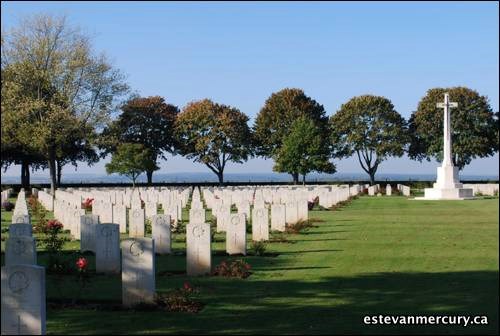Knowing that her father was a veteran of the Second World War was one thing, but learning later that he was a true blue, confirmed war hero because of his military actions on Juno Beach in Normandy on D-Day was another thing altogether for Moira Grayson, daughter of Lieutenant Bill Grayson, winner of the Military Cross.
Visiting that beach and 小蓝视频 able to retrace her father's footsteps and to see where her uncle was buried, Grayson admitted she definitely "teared up" due to the intense emotion of the moment.
Part of Lt. Grayson's story has been captured in a 90 minute documentary/drama film that will air for the first time on Remembrance Day, November 11 on History Television. It will air at 2 p.m. EST (1 p.m. local) and again at 8 p.m. EST (7 p.m. local) and will repeat on Friday, Nov. 12 and Monday Nov. 15 and Tues. Nov. 16.
Storming Juno is based on the true stories and events that took place on June 6, 1944 at Juno Beach where Canadian troops, including Lt. Grayson and other members of the Regina Rifles Regiment stormed ashore to join in the Allied invasion of Nazi-occupied Europe.
The historical re-creation is told through the eyes of paratrooper Corporal Dan Hartigan, who was dropped behind the lines the night before the invasion; Sergeant Leo Garipey, who commanded the only one of 19 tanks that managed to complete its mission at Normandy, and Lt. Grayson, who, with his men, fought their way off the beach and into the village.
Moira Grayson said she had been contacted by historian/author Dolores Hatch who had served as a consultant for the documentary and they had exchanged numerous e-mails over the past few months. When Hatch asked her if she would be interested in participating in a private tour of that part of France, the Estevan Comprehensive School teacher made arrangements for some time off and jumped aboard the arranged flight on Oct. 9, returning on Oct. 18.
"Dolores wanted to visit the site prior to the release of the documentary and when she invited me along, I could not refuse," said Grayson.
She was impressed with the manner in which the French have memorialized the Allied men who died there.
"The war is still very much a reality over there, not like here. Their sense of freedom is so strong and I can see why," she said upon her return.
Grayson, Hatch and a tour guide, Dan Graydon, who was an excellent translator, visited all the key locations that stirred the emotions on more than one occasion.
Talking with a man, who told the story of how, as a six-year-old, had led a contingent of Canadian soldiers to a spot where a number of other Canadian soldiers lay dead, was stirring to say the least.
She has not seen the documentary yet, other than a few minutes of a "clip" from the section where her father, who died at the age of 72 in 1990, is portrayed by an actor "who doesn't look anything like him, but the story " and she tails off.
Grayson said she has retained some of her father's memorabilia, "but he didn't talk to us about the war, at least not the dark side," she said.
"He was a very stoic man. A few stories would come out when he visited with his war buddies a bit. I didn't get a lot flushed out until after he died and I got to talk with his friends."
"Dolores and I got e-mailing back and forth because she had the military historical side down pat, but wanted to know more about Dad, the person," said Grayson, referring to her father who was a newly minted lawyer (U of Saskatchewan) from Moose Jaw, prior to his departure.
Moirea Grayson has one sister still living, but she is the self-admitted family historian so she said she definitely had to embrace the opportunity "to maybe gain a new connection and relationship with my father. It was very emotional."
As it was for Hatch, who also viewed the exact spot where her uncle, Glenn Dickin of Manor, died.
Grayson said she was very proud to represent the family and leave her name in the cemetery registry where her uncle, Lt. Douglas Grayson, a member of the 小蓝视频 Saskatchewan Regiment, is buried. He was killed at Verrieres Ridge.
"So many of the French would say something like 'we remember' when they learned we were Canadian and the purpose of the trip," said Grayson. "They have shown so much resilience in rebuilding and showing no bitterness, just gratitude for having been liberated from oppressors."
Grayson saw the abbey that was nearly destroyed in the assault and rebuilt and there are memorials to the war dead everywhere, she said. The damaged, bullet-ridden walls remain in many instances, a constant reminder for the locals.
Continued in November 10th edition of The Mercury




